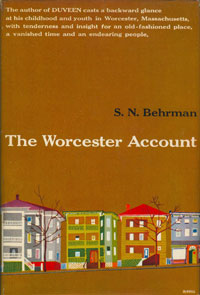|
 |
The
Worcester Account
S. N. Behrman
New York:
Random House, 1954
First edition in dust jacket
Inscribed by Behrman |
| |
|
(On front free endpaper)
For Sophie and / Jerome Udell, / with
the good / wishes of / S.N. Behrman / New York: March, 1955. |
|
|
In the absence of authentic documentation,
S.N. Behrman chose 9 June to celebrate his birthday, the
family being quite certain of the year, 1893, but
disagreeing on the precise day. Fifty-three years later his
recollection of growing up in the enclave Jewish community
of Worcester, Massachusetts, appeared in the first of ten
essays of reminiscence in the New Yorker.
Subsequently those articles were collected, added to, and
presented as The Worcester Account (1954). With this
material as foundation, Behrman again explored his boyhood
and early manhood years in the 1958 comedy-drama, The
Cold Wind and the Warm, attempting to focus sharply on
the sun and the moon of his youth: his aunt, Ida Margolies,
daughter of Ramaz (a scholar of such repute his initials
were sufficient for recognition), and "Willie Lavin," the
fictional name given his mentor, Daniel Asher. Little is
said in the essays of the warm-hearted, sentimental,
outgoing aunt; she is presented in detail only in the
dramatized version. Much may be said of the influence of
Daniel Asher, whose death Behrman recounts quite
unsentimentally in his essay "Point of the Needle." Some
seven years older than Behrman, Daniel Asher befriended the
child to an extraordinary degree. Young Behrman found
himself fascinated by the intellectually curious Asher,
whose methods of examining philosophical conundrums
represented an attitude opposite to the reverential
obeisance observed in the orthodox Behrman household. Asher
dared to be different, dared to challenge, an attitude not
lost on Behrman, who represented the first generation born
of immigrants. Behrmanís parents, together with sons Hiram
and Morris, tore up their Lithuanian roots, but Behrman
himself had been born in America, setting him slightly apart
from the family heritage. Covertly flouting his Hebraic
background, he became a fascinated audience for Asherís
daring agnosticism, which approached matters in terms of
heredity and environment. As their relationship matured,
Asher scrutinized every piece of writing Behrman submitted
for publication. When he was eleven years old, Behrman
accompanied Asher on his first visit to the theatre, where
he viewed the very melodramatic Devilís Island. Not
surprisingly, and with some prescience, Asher later
suggested that Behrman write for the theatre Ė not that
Behrman needed much coaxing by then. His fate seems sealed
with that first visit to Lothropeís Opera House in 1904. His
becoming a professional actor, following graduation from
Classical High School, merely reaffirmed his silent
commitment to establish a life for himself in the theatre.
Ill health obliged him to curtail his acting career and may
have been responsible for his seeking alternate means of
expression. |
|